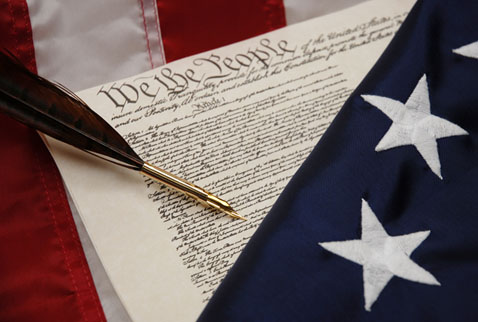The U.S. Constitution is Not Just Words
Jeffrey Sikkenga
September 21, 2021

Originally published by the Washington Times
Friday, September 17, is Constitution Day: a day set aside to commemorate the original signing of the document that has governed us for more than 230 years. But how do you honor a document?
It’s not like Independence Day, July 4, when we celebrate the birth of our country with colorful fireworks, parades, and BBQs. It’s not even like President’s Day or MLK Day, when we focus on great Americans like George Washington, Abraham Lincoln, and Martin Luther King Jr. They were flesh and blood—real people with extraordinary stories: Washington crossing the Delaware; Lincoln freeing enslaved people; King marching for justice.
In contrast, Constitution Day may seem a little boring. After all, the Constitution is just words.
But the Constitution has a great story too. It was born in a crisis; its birth has been called “the miracle at Philadelphia.” It endured conflict over slavery, a civil war, economic depression, and even two world wars. It has been at the center of some of our fiercest national debates.
Unfortunately, we can’t tell the story of something we don’t know. And too many Americans—especially young people—are unfamiliar with the U.S. Constitution and its essential place in our history and, importantly, in their own lives.
As part of the most recent National Assessment of Education Progress (NAEP) test in civics, given to thousands of eighth-grade students nationwide and released last year, nearly three-quarters (74 percent) of all students reported “low to moderate confidence levels” in their civics-related knowledge or skills. At least they were honest with themselves since fewer than a quarter (24 percent) scored at or above the “proficient” level in the civics exam.
Even worse, when students study the Constitution, they often don’t discover the riveting story of the “miracle at Philadelphia.” Instead of reading the Constitution itself and the powerful arguments given by both advocates and critics, such as those writing what is known as The Federalist Papers (which appeared in several New York newspapers), students are often spoon-fed the views of today’s textbook writers. Instead of digging deep into the compelling principles of equality and liberty at the heart of the Constitution, students typically race through the material without really learning it. Some might memorize the “what” of the Constitution, but few know the more interesting “why.” No wonder they don’t care.
And when they do focus on the more significant issues of the Constitution, too many are now being told that the Constitution was simply a tool of racial or economic oppression, rather than a charter of freedom, as it has been seen by generations of America’s most thoughtful and passionate defenders, from Washington to Lincoln to King.
So, what story do they need to learn?
Not that the Constitution is perfect— we know it isn’t. It’s been amended 27 times. No, they need to discover for themselves that the Constitution is a “glorious liberty document,” as the great abolitionist Frederick Douglass called it, that puts into practice the principles of our Declaration of Independence. Those principles make us “one people,” as the Declaration says. They define who we are as Americans. They matter.
Students also need to learn that American history is the story of our ongoing struggle to live up to our country’s founding principles of freedom. As Dr. King put it in 1963, “when the architects of our republic wrote the magnificent words of the Constitution and the Declaration of Independence, they were signing a promissory note to which every American was to fall heir. This note was a promise that all men, yes, black men as well as white men, would be guaranteed the unalienable rights of life, liberty, and the pursuit of happiness.”
On this Constitution Day, we need to rededicate ourselves to the principles of the Constitution and the compelling way in which they have shaped our history as Americans. We need to bring these principles alive again in the hearts and minds of all Americans, especially the young.
There’s no better way to honor the document that has given the blessings of liberty to so many.

